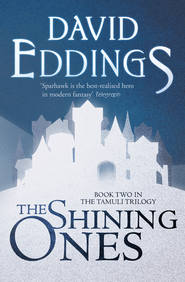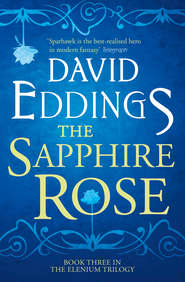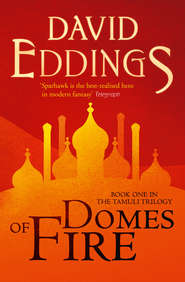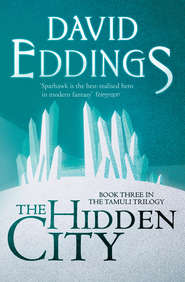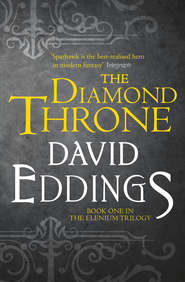По всем вопросам обращайтесь на: info@litportal.ru
(©) 2003-2024.
✖
Crystal Gorge
Автор
Год написания книги
2019
Настройки чтения
Размер шрифта
Высота строк
Поля
Chief Old-Bear laughed. ‘I imagine that might have upset the Vlagh just a bit.’
‘More than a bit, my chief,’ Longbow replied. ‘We could hear her screaming from miles away.’
‘Is there something happening that I should know about?’ Red-Beard asked curiously.
‘It’s a very old story that’s been handed down in our tribe for years and years,’ Longbow explained. ‘It has to do with a crisis that lies off in the future and what we’ll have to do to meet that crisis. There are some references to strangers in the myth – probably Sorgan and Narasan – and to some elemental forces – fire, water, wind – that sort of thing. The story’s possibly been garbled just a bit over the years, but down at the bottom, it seems to be very close to what we’ve encountered so far.’
‘Are there any hints about what we ought to be looking for up in the north or off to the east?’
‘Nothing very specific,’ Longbow replied. ‘Visions of one kind or another tend to get just a bit garbled as time goes by.’
‘Do you think the outlanders will need our help if the creatures of the Wasteland attack the Domain of Zelana’s older brother, my son?’ Old-Bear asked.
‘Probably not, my chief,’ Longbow replied. ‘The Tonthakans are fairly good archers, and if the Maag smiths cast bronze arrowheads for them, they should be able to do what needs to be done. If things start getting out of hand, though, I’ll send word to you.’ He paused. ‘How is One-Who-Heals getting along?’ he asked.
‘Not too good, my son,’ Old-Bear replied. ‘It would seem that age is one of the diseases that he can’t heal.’
‘That’s too bad,’ Longbow said. ‘He is – or was – a very good teacher.’ Then he looked at Red-Beard. ‘I’ll be back in just a little while and then we can paddle on back to the Seagull and join our friends.’ Then he left Chief Old-Bear’s lodge.
‘Where’s he going?’ Red-Beard asked Longbow’s chief.
‘To visit Misty-Water, probably,’ Old Bear replied.
‘Oh,’ Red-Beard said. ‘I don’t think he’s ever mentioned her to me – or anybody else – but some of the men in your tribe spoke of her on occasion. People who don’t know about her don’t understand Longbow, and he frightens them. Of course, sometimes he even frightens me.’
‘He was not always like he is now, Red-Beard,’ Old-Bear said. ‘The time will come, I think, when he’ll draw his bow with the Vlagh for his target.’
‘I hope he doesn’t miss when that day comes.’
‘I wouldn’t worry, Red-Beard,’ Old-Bear replied. ‘Longbow never misses when he draws his bow.’
‘I’ve noticed that.’
‘I’m sure you have. Everybody who’s ever met him notices that.’
CASTANO (#ulink_52b6d66f-fe6b-5af4-8448-4bdba625158d)
1 (#ulink_b027a254-52d7-57ec-9e1d-ad82c751143f)
The meadowlands of the clan of Ekial of Malavi lay near the north coast, and that gave the clan a certain advantage over the clans that lay farther to the south. The cattle-buyers from the Trogite Empire did business in the coastal towns surrounded by extensive cattle-pens and with loading piers jutting out into the sea, and that made things very convenient for the northern clans, since there were no long cattle-drives involved when the time came to sell cows.
The village of the clan was a pleasant place near the southern edge of the clan territory where a sparkling brook came tumbling down out of the hills which lay to the south. The meadows surrounding the village were lush and green, so the cattle had little reason to wander off.
The pavilions in the village were made of leather, of course, and there was a certain advantage to that. The Trogite cattle-buyers in the coastal towns lived in houses made of wood, and once those houses had been built, they stayed where they were. Leather pavilions, however, can be moved without much difficulty if necessary.
It was not uncommon among the Malavi for a proud father to announce that his son had been riding horses since before he learned how to walk. That was probably an exaggeration, but Ekial couldn’t remember a day when he hadn’t spent most of his time on horseback.
There were several other boys of about the same age as Ekial in the village, and, quite naturally, the boys spent much of their time racing. The horses their fathers had given them when they were still quite small had been rather old and tired, so they didn’t run very fast, but the boys still enjoyed those races. Ekial had several friends among the boys of the clan, and those friends were about the same age as he was. Ariga was maybe a year younger than Ekial, and Baltha and Skarn were a bit older, but they all got along well with each other.
Ekial wasn’t quite sure just why it was that the other three boys deferred to him as they played together. He wasn’t the biggest, certainly, and the horse his father had given him wasn’t the fastest, but for some reason, they seemed to expect him to make the important decisions – ‘let’s race,’ ‘let’s give the horses time to catch their breath,’ or ‘isn’t it just about lunchtime?’
As the years moved on, the boys learned many things by listening to the conversations of their elders around the fire after the sun went down. The standard myth in the meadowland of Malavi was that in times long past, horses had been a gift from the god Mala. It was an entertaining story that was often repeated around the fire after supper, but Ekial and his friends were quite sure that there was little truth in the story. An untamed horse could hardly be called ‘a gift’.
Ekial learned that the hard way when he was about twelve years old. Custom demanded that every man should tame his own mount before he could be recognized as a real Malavi. The wild horse his father gave him on his twelfth birthday was ‘spirited,’ a common term among the Malavi that glossed over the true nature of wild horses. Ekial privately believed that ‘vicious,’ ‘savage,’ and ‘evil’ might come closer to the truth.
Of course, the fact that his gift horse broke his right arm the first time he tried to mount the beast might have played some part in his opinion. After his arm healed, Ekial approached his ‘gift’ with a certain caution. He had a fair amount of success with twisting the horse’s ear – very hard – but then the problem of biting came up. Ekial learned never to turn his back on his horse, and he took to carrying a stout strap. After he’d slashed the horse across the nose with the strap a few times, the beast evidently decided that biting his owner wasn’t a very good idea.
In time, Ekial and ‘Beast’ grew to know each other better, and a wary sort of peace was established. Ekial still avoided turning his back on Beast, but otherwise things went rather well.
Ekial even developed a certain pride when it became increasingly obvious that Beast could outrun any other horse in the clan. Races were quite common in the meadowland, and there was usually quite a bit of betting involved. Ekial was hardly more than a boy at that time, and Beast was obviously still about half-wild. The men of the clan spoke rather disparagingly of ‘that little boy and his barely-tamed horse,’ and they feigned a certain reluctance to put any sizeable amount of money on them. They always insisted on what the Malavi called ‘odds’. Two-for-one was fairly common in Malavi horse-races, but the men of Ekial’s clan usually demanded four-for-one, and the men of other clans almost always agreed.
The men of Ekial’s clan won a great deal of money that first summer, but the word that Ekial and Beast could probably outrun their own shadows spread rapidly, and the odds turned around significantly. The men of some tribes even went so far as to demand ten-for-one. But, since Ekial and Beast never lost, the men of the clan still won money.
By the third summer, however, nobody in any other clan would accept any odds at all, and Ekial and Beast retired – undefeated.
Despite the fact that the clans of the meadowland of Malavi found the racing of horses most entertaining, their primary business involved the raising and selling of cattle. It was generally known in that part of the world that the lush meadows of Malavi produced the finest beef to be found anywhere at all. There had been occasional attempts by the Trogites off to the east to incorporate Malavi into their growing empire, but that hadn’t turned out at all well for the men who called themselves ‘civilized’. Since the Trogites had no horses, they couldn’t move as fast as the clansmen of Malavi could, and their occasional incursions into the meadowland had turned into unmitigated disasters.
The most recent incursion by the Trogites had occurred when Ekial and his friends were still boys, and the response of the clans had been brilliant. Rather than fight the invaders, the clans sent word to the Trogite cattle-buyers along the north coast that they would not sell so much as a single cow to anybody until all the soldiers had been removed from the meadowland.
Since all Trogites worshiped gold, the cattle-buyers were able to persuade the Palvanum, the ruling body of the empire, to pull their armies out of the meadowland and keep them out.
After that incident, the Malavi realized that they controlled the cattle-market, and that they did not have to accept the first price for their cows offered by the unscrupulous cattle-buyers. And so it was that the clan-chiefs of the meadowland gathered together each spring to decide what price they would demand when the Trogite cattle-buyers came to the land of the Malavi.
The complacent, superior expressions on the faces of the cattle-buyers faded to be replaced by expressions of horror when the clans all rejected the buyers’ offers and came back with a much higher price. And the flat statement, ‘That’s the price, take it or leave it,’ cut off all the haggling.
Rumor had it that the price of beef in the empire went up significantly that year, and that there were many speeches denouncing the Malavi delivered in the hallowed halls of the Trogite Palvanum.
A few Trogite adventurers saw what they thought to be a glorious opportunity to make huge amounts of money in what had come to be called ‘the beef crisis’. There were cows by the millions in Malavi, and it appeared that nobody was watching them. The cattle trade could be enormously profitable if they weren’t required to pay for the cows they sold. There were a couple of problems, however. The Trogite adventurers overlooked the fact that cows have horns, and that despite what appeared to be the fact, the Malavi – armed with sabres and long, sharp lances – always kept watch over their herds. There were several unpleasant incidents, and the notion of ‘free cows’ was quickly abandoned.
Ekial’s clan elevated one bad-tempered old bull who had gored five Trogite cattle thieves in rapid succession to the status of ‘defender of the herd,’ and they’d fed him much more than was really good for him. He died not long after his elevation – either of old age or overeating.
The clan gave him a very nice funeral, though.
Ekial and the other young men of their clan found the story of ‘one price’ to be very amusing, but they had other, more serious things on their minds just then. The herding of cattle might appear to be quite simple, but the young men of the clan soon discovered that it was extremely complicated. Cows are not the world’s brightest or bravest animals, and it doesn’t take very much to frighten a cow. One frightened cow isn’t much of a problem, but a hundred frightened cows could quickly turn into a disaster. The standard practice involved ‘turning the herd,’ and that was extremely dangerous. Ekial’s boyhood friend Baltha was killed when his horse stumbled and threw him during one of those stampedes.
There were other things involved in the lives of Malavi herdsmen that had very little to do with cows. Disagreements about the ownership of streams and lakes were quite common, and there were frequent disputes about which clan owned a stray cow. Those arguments were quite often settled with sabres or lances.
As Ekial, Ariga, and Skarn matured, the older men of the clan gave them instructions in how to use the sabre. ‘Slash, don’t poke,’ was the cardinal rule when it came to sabres. As one scar-faced old man put it, ‘If your sabre happens to get tangled up in your enemy’s innards, there’s a fair chance that it’ll get jerked right out of your hand as your horse runs past him, and that’s a very good way for you to wind up dead.’
The lance, on the other hand, was made for poking. The Malavi lance was about twenty feet long, and its original purpose had been to turn a running cow. Back in those days, the Malavi lance had been blunt-ended, and it could literally push a cow in a different direction. The addition of a sharp metal point was a recent development that had appeared during the Trogite invasion, and that in turn had led to the extension of the Trogite shield. The world of weapons seemed to be changing all the time.
As the seasons passed, Ekial’s reputation became based more upon his skills as a herder and warrior than upon those early years when he and Beast won every race they entered. The older men of the clan approved of his growing maturity and skills as a herder.
And then, not long before his twenty-eighth birthday, there arose a dispute with a neighboring clan about the other clan’s decision to dam off a small brook. There was no question that the brook originated in the other clan’s territory, but damming off streams of water that flowed into the lands of a neighboring clan had always been considered to be an act of war.
Ekial’s response, however, was somewhat unusual. Instead of mounting a daylight attack on horseback, Ekial, Ariga and Skarn waited until nightfall and then followed the now dry stream-bed into the other clan’s territory on foot.
‘This is so unnatural,’Ekial’s friend Ariga muttered as they quietly clambered over the large dry rocks and through the dense brush.







